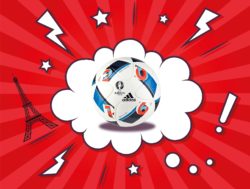 We are all familiar with the “bleeping” out of curse words on television and radio — well, most television and radio — under FCC rules. Sometimes there is a beep, sometimes silence, but the terminology has changed from beep to “bleep.”
We are all familiar with the “bleeping” out of curse words on television and radio — well, most television and radio — under FCC rules. Sometimes there is a beep, sometimes silence, but the terminology has changed from beep to “bleep.”
In writing, symbols are generally used to take the place of curse words, swears, cuss words — whatever you want to call them.
Often we see an asterisk to replace letters, especially vowels in the middle of a “bad” word (for example sh*t or f*ck).
However, there is no set rule. Much of the time a random series of symbols is used to replace an unspecified swear word, where the reader can supply his or her own word. Some common symbols used are &#%!@?, but you can pretty much do what you want there.
So either one of these is fine:
- You’re such an &#%!@?!
- “You’re such an a***hole!
Note that in the second bullet point, the number of asterisks doesn’t match the number of letters left out. That seems to be okay too, although a**hole would suffice, I am sure.
And yes, there is a word for this type of swearing! Actually two words: grawlix and profanitype.
This particular type of profanity is older than the “bleep,” and was first seen in comic books..
In a 1964 article for the National Cartoonist Society, Beetle Bailey creator Mort Walker coined the term grawlix, which now refers to the string of symbols that sometimes stands in for profanity. Anger and swearing is common in comics, but often not appropriate — thus grawlix.
We can go even farther back. Strings of various symbols were seen in the speech balloons of print comic strips as early as the 1880s! This early use was in Rudolph Dirks’ The Katzenjammer Kids comic in the New York Journal.
When spoken, the grawlix is read as “bleep.” Who remembers that movie What the Bleep Do We Know? some years ago — that movie about quantum physics taken from the book The Secret?
Of course, there is an alternative to the audio bleep or the visual grawlix: replacing the unacceptable words with gentler words, such as jerk (for a**hole) or freaking or frigging or even f-ing (for f*cking) or gosh or darn for the now-mild damn, or jeepers for sh*t!
Your choice! &#@@!%#
Sorry, but there will be no blog post coming out next weekend. The Grammar Diva is going away to her high school reunion….but in October, new blog posts will resume — back to the parts of speech series. Will miss you all!



Shit….. but what about when you don’t fuckin know what the word is? Like if I wrote …. You can go and &#%!@?! yourself, how would we interpret what the damn word was? Are there different symbols in different bitchy orders for different cuss words or something, like damn you didn’t really answer what I wanted to hear….
Generally you use the same number of symbols/letters as the original word, and you use some of the letters: s*$t, for example.
There is no God in the lives of those saying bad words. Bring back the bar of soap!!
I disagree. They are just words. Actions count more. But you are entitled to your opinion.
Just to remind that in British English a***hole is, actually, the correct number of asterisks. 🙂
Ha! Yes!
How about “blankety-blank”? I use thank frequently in speech. Thanks.
Must say I have never heard that used either in speech — or probably in writing, but you are free to do so!
It’s good to remind me of that. Why don’t you write something about normal writing an essay, for example.
Good idea. I do have a possible guest post about writing, but not about the actual craft of essay or paragraph writing. I will definitely do a post about writing an essay, probably in October.